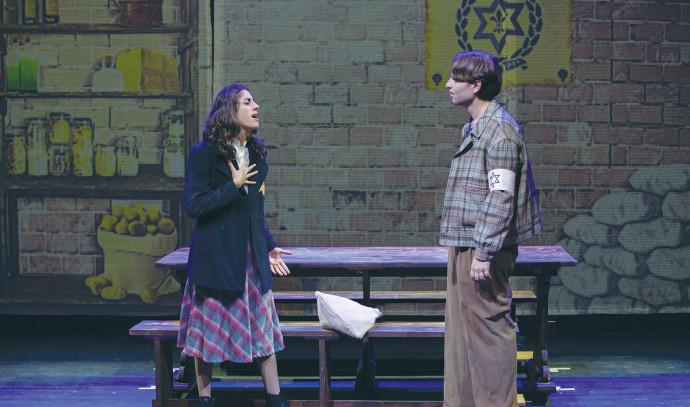Ben Shapiro’s surprising move to musical theater

When you think of Ben Shapiro, several images likely spring to mind: the rapid-fire, often polarizing political commentator, known for his sharp analyses of American politics and culture wars. But Shapiro, the musical creator? That’s a turn not many would have expected. Yet, here we are, with Shapiro and his father, David, co-creating We Will Rise, a full-scale musical set to tour Israel in eight shows from the end of this month through December. It’s a bold artistic leap for Shapiro, tackling themes of Jewish survival, resilience, and – as one might expect from him – unity.
Sitting down with him, you quickly realize that We Will Rise isn’t just a creative side project; it’s deeply personal. This is a story rooted not only in Jewish history but also in Shapiro’s family and his own journey.
“My dad and I have always been close,” Shapiro tells me, clearly enjoying the chance to talk about something beyond the usual political debates. “Music was a huge part of my upbringing. My dad’s been playing piano professionally since he was a teenager – he’s a composer and pianist and has been creating music for decades. I started playing the violin when I was five, so music was always in our home.”
For Shapiro, this musical represents more than just an artistic endeavor; it’s a collaboration between father and son, built on a lifelong love of music and Jewish history.
“We’ve worked on smaller things together, but We Will Rise? This is a whole new level. It’s bigger than anything we’ve done before.”
The idea for We Will Rise began back in 2019 when Shapiro listened to some of the music his father had written for an earlier, unrealized project.
“My dad had these amazing compositions that were tied to a different story, and I thought, ‘These tunes deserve something more. Something epic,’” Shapiro recalls. The father-son team started brainstorming and ultimately settled on the Warsaw Ghetto Uprising as the backdrop.
“I’ve been fascinated by the Warsaw Ghetto Uprising for years,” Shapiro says. “It’s one of the most powerful stories of Jewish resistance. Even though they knew the odds were stacked against them, the Jews in the ghetto chose to fight back. It was an act of defiance and courage that’s always resonated with me.”
Shapiro’s personal connection to music is a constant thread in his life, stretching back to his early childhood. “I grew up in a musical household,” he says.
“There’s this great story of my dad playing piano in nightclubs when he was just 14 or 15 years old, trying to make a living. He was composing music for TV and film in Hollywood when I was growing up. Music was his life. It became mine, too, at least for a while.”
Shapiro reminisces about performing with his father when he was just a child. “I remember being 12 years old and playing the theme from Schindler’s List with him at an event. I was such a perfectionist even back then. If I missed a note, I’d be upset for days.”
You can still find recordings of these performances online. “There’s a video on YouTube of us playing together when I was 11 or 12,” he laughs. “I’m still proud of those moments. It’s funny – music is where I started before politics took over my life.”
Weaving history and the present
The plot of We Will Rise shifts between two timelines: the Warsaw Ghetto during World War II and modern-day Israel. The musical opens with two Israeli soldiers, one secular and one religious, walking through a destroyed Gaza, discovering a photograph in the ruins. The picture – showing a baby and her uncle – sends the characters and the audience back to the Warsaw Ghetto, where the Jewish resistance to the Nazis is unfolding.
Shapiro explains that the structure of the story was intentional. “We wanted to show that the fight for Jewish survival is continuous. It’s not something that happened in the past and ended. It’s ongoing. Whether it’s the Warsaw Ghetto or today’s conflicts in Israel, the challenges Jews face aren’t over. They just change forms.”
The heart of the musical focuses on the Warsaw Ghetto Uprising – a period of history that Shapiro is particularly passionate about.
“The Uprising was one of those moments in Jewish history where the Jews knew they didn’t stand much of a chance, but they fought anyway. The bravery, the sacrifice – that’s something that should never be forgotten. It’s not just a story of survival; it’s a story of resistance, of standing up even when you know the odds aren’t in your favor.”
The musical, which features the Israel Sinfonietta Beersheba and a 30-piece orchestra conducted by Rani Calderon, is ambitious in scope. “As far as we know, this is the biggest original musical ever staged in Israel,” Shapiro says with a smile. “It’s not something you see often here – Israel doesn’t typically produce large-scale original musicals with full orchestras. But this story – this music – deserves that kind of production.”
The impact of October 7
Although the musical was originally written before the October 7 attacks, those events have dramatically shaped the final version of We Will Rise.
“We were already in the process of making changes when October 7 happened,” Shapiro says. “But after that day, everything shifted. The themes of Jewish unity and resilience, which were already central to the story, became even more immediate. We knew we had to reflect the reality of what was happening in Israel.”
The opening scene, which originally focused solely on the discovery of the photograph of the baby and her uncle was rewritten to include the devastation caused by the October 7 attacks. “We wanted to make it clear that the struggle for survival isn’t over.”
Shapiro goes on to explain that the ending of the musical, which originally saw the Jewish characters from the Warsaw Ghetto sing We Will Rise, now features modern Israeli soldiers joining them on stage. “The ending is the most powerful part for me,” Shapiro says. “The characters from the Warsaw Ghetto sing We Will Rise as they move through the fog, but now, they’re joined by the Israeli soldiers who realize that their fight is the same. The fight to protect the Jewish people is timeless.”
Father and son collaboration
Though Shapiro is widely known for his political commentary, We Will Rise is very much a joint effort between him and his father. “My dad is the genius behind the music,” Shapiro says with pride. “He wrote the score, the lyrics – everything. I helped with the libretto, the plot, and the dialogue. But the music? That’s all him.”
The collaboration between father and son is the beating heart of the production. Shapiro recalls how his father had always dreamed of creating a successful musical: “My dad had written a few musicals before this – one of them was about the Scarlet Pimpernel, but it never really took off. He’s been composing music for years, working on TV and film scores in Hollywood. This musical was a chance for him to finally realize one of his biggest dreams.”
Shapiro’s reverence for his father’s talent is evident in how he speaks about the production. “The music my dad wrote for We Will Rise is incredible,” he says. “It’s emotional, it’s powerful, and it tells the story in a way that words alone can’t. I think people are going to be blown away by it. My mom was in tears during rehearsals, and she’s not one to cry easily.”
Revisiting Jewish identity
The message of Jewish unity is central to We Will Rise, and it’s something that resonates deeply with Shapiro.
“We’ve faced existential threats throughout history, and we’ve survived because we’ve stood together. Whether it’s the Warsaw Ghetto or today’s conflicts, the lesson is the same: If we don’t unite, we fall.”
The musical delves into how divisions within the Jewish community can weaken it in the face of external threats.
“One of the things we explore in the musical is the idea of internal division,” Shapiro says. “The two soldiers in the present day – one secular, one religious – represent the divides that we still see in Israel. But when they’re faced with the reality of survival, those differences don’t matter anymore. That’s the message we’re trying to send.”
The relevance of this message has become even more pressing after the October 7 attacks, which have left Israel grappling with its internal and external challenges.
“Before October 7, the country was tearing itself apart over judicial reform,” Shapiro says. “But after the attacks, the conversation shifted. Suddenly, people weren’t focused on the divisions anymore. They were focused on survival. And that’s exactly what the musical is about.”
‘Dangerous levels of division’
Although We Will Rise is meant to be apolitical, Shapiro’s role as a political commentator inevitably colors how the production is perceived.
“Look, this musical isn’t about politics. It’s about survival, it’s about unity, and it’s about resilience,” Shapiro emphasizes.
But it’s hard to talk about the themes of the musical without touching on the current political climate in both Israel and the US.
“What we’re seeing in both countries is a dangerous level of division. People are treating every political disagreement as if it were a life-or-death issue, and that kind of rhetoric is tearing societies apart,” Shapiro continues. “You hear things like, ‘If we don’t win this election, the country is over,’ or, ‘There will never be another election.’ That sort of language is damaging, whether it’s in Israel over judicial reform or in the US during election cycles.”
For Shapiro, the lesson from We Will Rise applies directly to these political divisions.
“The Warsaw Ghetto Uprising teaches us that, in the face of real existential threats, internal divisions are a luxury we can’t afford. And I see that same danger in Israel and America today. We’re so focused on fighting each other that we forget there are real enemies out there, waiting for us to fall apart from within.”
Shapiro is no stranger to political debates, and he’s clear-eyed about how his reputation as a conservative commentator might influence how people perceive the musical.
“I know there are people who will see my name attached to this project and assume it’s political. But this isn’t about politics. It’s about something bigger. This is about the survival of the Jewish people – that’s it. If people can see past their preconceived notions about me and focus on the message, I think they’ll find that this story resonates on a deeply human level.”
In fact, Shapiro sees the themes of We Will Rise as universal, transcending the specifics of Jewish history and speaking to broader issues of resilience and unity in the face of adversity.
“What we’re talking about here is the human condition – the struggle to survive, the importance of coming together when it matters most. It’s a story that applies to anyone who’s ever faced an uphill battle.”
Will it make it to Broadway?
With the musical set to play across Israel in several major cities, including Beersheba, Jerusalem, and Tel Aviv, Shapiro is already thinking about what comes next. “We’ve had interest from funders in bringing the musical to the US, especially in Florida, where there’s a large Jewish community,” he reveals. “The themes are universal, and I think We Will Rise could resonate with American audiences, particularly given the current political climate. There’s something about this story – the idea of unity in the face of existential threats – that I think would hit home for a lot of people right now.”
But Shapiro is realistic about the challenges of bringing the musical to a wider audience.
“I know I have critics,” he admits. “But I hope people can separate me from the project and judge the musical on its own merits. This isn’t about me. It’s about a story that needs to be told, a story of Jewish survival and resilience that I think has relevance far beyond the Jewish community.”
He’s optimistic about the possibility of expanding the musical’s reach, not just in Israel but internationally.
“I’d love to see We Will Rise make its way to Broadway or at least to the US in some form. It’s a big project, but the story deserves that kind of platform.”
As our conversation winds down, Shapiro reflects on the personal significance of this project, both as a father-son collaboration and as a broader exploration of Jewish identity.
“This musical is deeply personal for me, not just because it’s something I created with my dad, but because it’s a story that’s so central to who we are as Jews. We’ve always faced challenges, we’ve always been under threat, but we’ve survived because we’ve found ways to come together when it matters.”
Shapiro is quick to point out that We Will Rise is not just about the past, but about the future.
“The Warsaw Ghetto Uprising is a powerful moment in Jewish history, but the lessons from that time are just as relevant today. We’re still facing existential threats – both as Jews and as a society. And the question we have to ask ourselves is: Are we going to let those threats divide us, or are we going to come together to overcome them?”
For Shapiro, the answer is clear. “We will rise,” he says, echoing the title of the musical. “But only if we rise together.”





